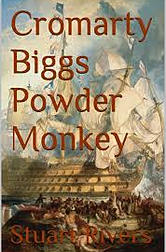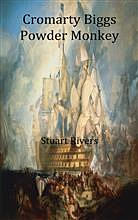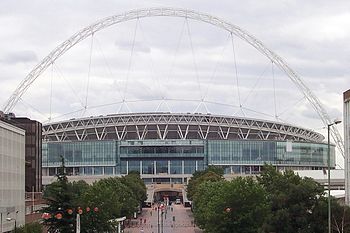| Mr. Magoo |
"They say that the bigger they come, the harder they fall."
"No!"
The bigger they come the harder they hit you!"
So, the last year at Mountford Manor Junior School was one of excitement about going up to the "Big" school and, with my own experience of dealing with bullies, I felt equipped for the step up to the next stage in my schooling. But, during the last summer holiday before donning the gold, silver and black tie of Walcot Secondary School in September, all the boys from Lainesmead and Mountford Manor Junior Schools destined for the 1st Form would be worrying about the two tenets held true by all male pupils of the "Big" school:
- We would have our heads put down the bog and the flush pulled (never happened)
- We would be taught by "Killer" Kitching (for 3 years!)
Now, there were "Old Skool" teachers at Walcot Secondary School who were strict, but they all held the respect of most of the children they taught. Mr. Preddy, the Deputy Head, was always well turned out, looking dapper in his suit and reminding me of Mr. McKay from "Porridge". If he told you to jump, you didn't ask "how high?", because you were already jumping. Mr. Baxendale, who I always thought was Scottish due to his "I'll cane yae laddie!" threat, was actually English from Northumbria or somewhere in close proximity to the English/Scottish border. He never did cane anyone, although he was a mean shot with a piece of chalk and only once in my memory did he throw a board rubber at someone mucking about at the back of the class. Mrs. Harland was my biology teacher and her reputation for being strict did not hold sway with her classroom persona. Miss Burbidge came across as a Miss Havisham-type character, although, having gained the wisdom of age, I now think she was probably a "lady in comfortable shoes". Whatever her alter ego was, at school she was an inspirational person who taught me that there was more to being a student of geography than learning facts by rote. Mr. Hallard or "Wolfman" as we knew him, was the most passionate teacher of the lot. His enthusiasm for classical music was brilliant, but it was as my RE teacher that I enjoyed the odd theological argument, calling into question his Christian faith. Then there was Mr. Kitching...
 |
| Ken Kitching |
Mr. Kitching wore a uniform of his own that never changed in my three years at Walcot Secondary School. His shirt was always striped with a collar too small for his thick neck, a tie that looked like it was that tight it was strangling him and his trousers were too short, rising about 1 to 2 inches above his shoes. The first time he took off his jacket to don his brown woodwork coat, the whole class fell apart as we saw his bright red braces holding up his "short" trousers - none of us had ever seen anyone wearing braces before and this pre-dated the skinhead/Mod revival of the late seventies/early eighties, so none of our peers or older brothers were using them yet instead of belts. On the sound of the laughter, he quickly spun around and demanded to know what was funny; no-one was brave enough to tell him, so the classroom fell into silence as he took the register. Now began the one aspect of his class that became the bane of my life for the next three years. Knowing nothing of his background, we were surprised that this teacher enjoyed singing and, when he called my name, "Rivers", he would regale me with lyrics from the song "Old Man River"...and it never got boring, old or stale!? He would also sing to us about the Japanese city of Nagasaki where "the men chew tabacky and the women wicky wacky woo". That was probably the only pleasant facet the man possessed, at least within the confines of the school day.
The first woodwork lesson was spent with "Killer" laying down the law as to what was expected of us as his pupils. To be honest, the only thing I learned about woodwork was the mantra that was displayed on the classroom wall:
- Plane the face edge
- Plane the face side
- Gauge the width
- Gauge the thickness
The only other thing I learned from him was how to stay on his good side. His first story was of his first teaching post which was at a borstal. He informed us that, in order to get these rough boys on side, he would select the toughest boy in the glass and effectively beat him to a pulp. After that the rest of the inmates would toe the line. The next thing he told us was that, if we asked them, all his past pupils would tell us he was "firm but fair". From the former story, the implication of this last message was that, by firm, he meant he had no compunction about beating boys and by fair, that he wouldn't be fussed about to which of us he gave that beating. Now the stories from the older boys about "Killer" Kitching began to lose the apocryphal veneer and reality began to dawn on those of us who had heard the tales of the fabled woodwork teacher firsthand. This weekly lesson was going to be no picnic.
Mr. Kitching had no time for teaching, at least not woodwork. Rather than allow us novices to learn by trial and error, he personally would assemble our woodwork projects and not always very successfully. One of the pieces we made was the notorious footstool. Being of such small stature. I found the tools unwieldy, especially the saw. Anyhow, I tried my best with the stool project and the component parts fitted together okay, but that was before he got his hands on it. He put the legs on back to front such that the stool wobbled like a rocking horse. After disparaging remarks from "Killer" and much ridicule in front of the class, I decided to keep my own counsel and bit my tongue, rather than backchat him and find out what his dap on my arse felt like. I took it home and was very disappointed in the outcome, despite the obligatory cooing from my mum and false praise from my dad, who, like me, could see it exactly for what it actually was - firewood held together by wood glue and nails. It became just that in the very cold winter of 1980/81 when it was used as kindling for our coal fire!
I witnessed a lot of psychological bullying by Mr. Kitching on my classmates. He would take every
opportunity to belittle someone rather than encourage them by offering advice on how they could improve their skills. He especially liked to humiliate the poorer schoolboys and took great delight one day in telling us all that we would not amount to anything and would all end up working in a factory. In one of our early lessons, Colin (I won't give his surname) had a problem with fitting his potato dibber together. "Killer" was busy, sweating buckets as he usually did, at the back of the woodwork room using the circular saw, preparing wood for a project he was doing for the headmaster. Colin asked for some help and advice and he was instructed to take the wooden tool to Mr. Kitching. On examining it, the perspiring woodwork master pronounced the work Colin had produced was useless and he promptly threw it down the length of the class. Shocked, the rest of the class froze at our benches to watch what was unfolding. We were told in no uncertain terms to get on with our work and Kitching shouted at Colin to get his potato dibber and bring it back to him. Colin did as he was told, dutifully picking up the two pieces of wood that made up the gardening tool and took it to the still sweating Mr. Kitching. He snatched it from the trembling pupil and attempted, to no avail, to get the dibber part to fit into the handle. Once more declaring that the piece of woodwork was rubbish, Mr. Kitching threw it down the length of the classroom and told Colin to fetch it like a dog. Colin picked it up and took it back to the teacher, but once more, Mr. Kitching hurled it down the classroom again telling Colin to get back to his bench. By this time, Colin was close to tears and was a nervous wreck, and just stood at his bench not knowing what to do. Mr. Kitching strode down the centre aisle of the classroom between the two rows of benches and planted himself in front of Colin, demanding to know what the matter was and for him to stop crying. This tirade only made Colin's tears worse, so Mr. Kitching took him by the shoulders and shook him like a terrier would shake a rat. By now Colin was almost hysterical and he lashed out at the woodwork teacher causing the burly man to drag him to the front of the class and administer a beating with the dap to Colin's behind. Satisfied that justice had been done, "Killer" sent Colin back to his bench and we were instructed to spend the rest of the lesson in silence.
Another savage beating at the hands of "Killer" Kitching was administered to Stephen (surname withheld). I can't remember what caused the incident to kick off, but Stephen was only slightly taller than me and he had done something to incur the wrath of the woodwork teacher; with Mr. Kitching, it was the slightest thing that could cause him to explode in paroxysms of rage - the man clearly had anger management issues! Stephen then committed the deadly sin of backchatting the teacher and Mr. Kitching set about him like Mike Tyson coming out in the first round. The screams from Stephen were unsettling to say the least and once again Mr. Kitching had shown how he was "firm but fair" with boys who were a quarter of his size.
There was always time at the end of the lesson for Mr. Kitching to dictate to us what the state of the world was, whose fault it was (the Labour Party and Communists) and how Margaret Thatcher was going to be the saviour of Britain. Single mothers were one of his favourite targets and he would condemn them at every chance he could. He would also bemoan the demise of the big band music scene and decry what he saw as the scourge of "beat" music. I saw that this right wing bully boy needed to be taken down a peg or two, but how to do it? My chance came towards the end of the third year when the summer holidays were looming and there was nothing more to do on our woodwork projects.
We were made to sit on our benches and listen to Mr. Kitching's latest right wing rant before he got onto the subject of summer holidays. Fortunately for me, he started at the front of the other row of benches and proceeded to grill each pupil on their family's holiday destination. The first classmate responded with his family's holiday plans and Mr. Kitching commented in one of two ways, depending on the reply he received:
- If the pupil told him that they were going on holiday, he would pass comment on the destination and equate it to the pupil's household income. For example, "We're going to Spain" would be met with a comment along the lines of "Your father must have a good job;what does he do for a living?" Praise would be heaped on the pupil commensurate with how far up the food chain Mr. Kitching thought the pupil's father was...anything with the word "Manager" in the title was extremely good and, if he thought that the father was a "Professional" even better. The inquisition would finish with where the pupil lived - Liden not bad, Eldene okay, Okebourne Park fantastic.
- If the pupil told him that they were not going on holiday, Mr. Kitching would question the pupil as to why not. He took great delight in embarrassing the child and digging into why their family wouldn't be going on holiday. "What does your father do?" "Is he a layabout?" "You must live on the council estates." "Park North; I'm not surprised you're not going anywhere."
"Rivers, where are you going on holiday?"
"Ourgate, sir," I promptly replied. Mr. Kitching looked puzzled. The class was so quiet, a pin dropping would have been heard in the gym.
"Ourgate? Don't you mean Margate?" Sensing a duel, the rest of the class looked from him to me as if at the Centre Court on Men's Final day.
"No, sir. Ourgate," I replied, looking him straight in the eye.
"Ourgate? Never heard of it." Usually, he would have ended the conversation, but I was fishing for the big one and I had a nibble on my line.
"Definitely Ourgate, sir."
"Ourgate. Where's Ourgate?" I had a bite, so I struck.
"At the bottom of our garden, sir!"
The class burst into laughter and there were one or two cheers. "Killer" looked me in the eye. I looked him the eye, waiting for the inevitable beating. The bell rung.
"Class dismissed!"
We left. I had bested "Killer" Kitching, the biggest bully I had ever taken on...I got a 4 for "Effort" that term!















































